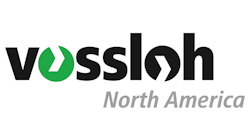Vossloh Kiepe Leads Cross Border Project, Setting the Pathway of Battery-Bus-Fleets
Arnhem’s overhead wire infrastructure for trolley buses will become a charging infrastructure for e-buses. In addition it will be the backbone of a smart grid. Arnhem’s new trolley buses will be able to be operated as battery buses in sections without overhead wires. Charging is carried out while the 18m battery bus is in motion, driving on charging roads (c-roads) under wires.
Vossloh Kiepe leads this cross border project in which 10 parties from Gelderland (NL) and North Rhine Westphalia (D) are involved. On June 30 Euregio Rhine-Waal committed the granting of the project E-bus 2020 IMC. In future Arnhem intends to change a major part of their Greengas powered bus fleet into IMC buses.
Within that project two IMC-battery-buses for wireless line extensions are developed. These articulated e-buses are able to drive at least 10 km without overhead wires.
The suburban areas, e.g. Renkum, can be connected by clean zero-emission buses.
Gas or diesel buses that operate partially on c-roads can be replaced by IMC buses. For this specific application the batteries need to be charged with high power, due to the limited time under the wires.
Dr. Besold, CEO of Vossloh Kiepe said, "The requested charging time for an 18m long articulated battery bus is higher than the available time at terminus. Even if the battery technology improves in the future the charging time remains an obstacle to implement long battery busses, especially for a big bus fleet. In motion charging allows to supply sufficient power to the vehicle for charging, driving and air conditioning. Therefore IMC is a key point for the sustainable implementation of e-bus fleets. Overhead wires are the most efficient and economic charging infrastructure allowing reliable zero emission public transportation in medium and big cities."
Arnhem as a European Testing Ground
Councilor Geert Ritsema of Arnhem is enthusiastic: "For many years our region has had the cleanest public transport in the Netherlands. The technological outcome of the project allows us to replace some Greengas driven buses with Trolley 2.0 buses, this will make our transport even cleaner. Arnhem is evolving to a European living lab for multimodal electric transport and smart energy distribution using the overhead wires. Arnhem will host an international conference on 5th of October, where the innovative and sustainable project will be presented."
Zero Emission
The developed technology will be integrated into trolleybuses, called Trolley 2.0, to be ordered by Hermes. The project will be completed in 2020. Dorothé Wennekendonk, region manager Connexxion: "It is an important project. The minister for Infrastructure and Environment is aiming for zero emission public transport. When functioning well the Trolley 2.0 buses are included in the timetable. We think the Trolley 2.0 concept has great potential."
Bram Veenhuizen, of The HAN University of Applied Sciences Arnhem-Nijmegen said, "Trolley 2.0 means the optimal use of charging infrastructure, a proven technology and already existing infrastructure. The HAN University of Applied Sciences will carefully monitor the functionality of the new buses and publish the results.”
Smart IMC Grid
The future demand of distributing electrical energy will grow in medium and big sized cities. Various electric vehicles will demand energy from the cities electric network. The current overhead wire infrastructure will not just supply the IMC buses with energy but also support the energy distribution in the city. Regenerative energy sources, such as solar and wind energy, will be integrated to the network. The deviation of energy demand and energy generation will be balanced by batteries, which are installed underground and integrated to the overhead wire net.
To this smart grid, the charging stations for e-cars will be directly connected, which enables residents and local companies to charge their e-cars. The city of Arnhem is a pioneer in the electrification of citizens’ mobility. Due to the Smart Grid, the available energy will be utilized in a more efficient way.
This EU-project demonstrates the new and powerful IMC concept combined with a smart grid, which sets the pathway for the implementation of a reliable battery bus fleets in other cities.

